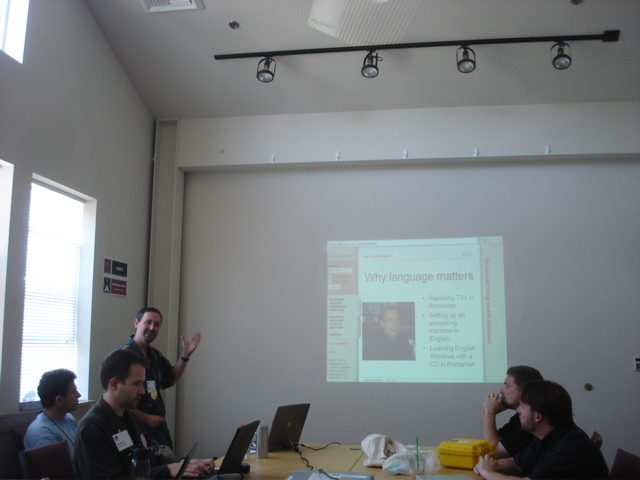June 23, 2007
Foo Camp: Making the web work for Africa
Why Language Matters
- Most tools are wrapped up in language - if you're trying to learn a tool that is wrapped in a different language, it will make the learning process extremely difficult.
Why African languages really matter
- Tried to teach some people how to swim - if the teachers didn't use the students native tongue, the swimming lesson would have ended really quickly.
- Language is the key to knowledge - for reading the news, doing your homework, browsing the web...
- Knowledge is the key to prosperity - for getting a job, selling a product, buying a company
- Very few Africans can access IT in languages with which they are comfortable
- Local language IT - the killer app for technology uptake
- IT master as a path to prosperity: it works in India (for those who speak english), it works for you. How do we make it work in Africa?

Martin Benjamin starting his talk
Swahili Overview:
- 100 million speakers
- About 1.5% of world's people
- Most widely spoken African language
- Started as a participatory "living" project on Gopher in 1994
- ~70,000 bilingual entries
- 10M+ lookups
- tens of thousands of users in Africa (wish it was more - making an SMS frontend could be huge)
- Anyone can edit, but edits must be approved.
- free to search, download, and print
PALDO - future of IT in Africa
- Pan-African Living Dictionary Online
- ~2000 languages in Africa
- 20 language clusters (group of languages that are similar enough that people who know one can kindof/sortof grok another) account for about 85% of the African population, roughly 850M people
- Make each language indexed to every other language - so you can go from any language to any other language
- Start with 10,000 words in each language, based on popularity in Kamusi
- Cross index by machine, later by humans as well
- modular - more languages can be added
- English as the lingua franca - basis of index and translation
- omega wiki - closest project doing a similar thing; PALDO guys are working with them.
- Yale currently holds copyright on the data, but has agreed to release it to a new home, which is yet to be decided.
PALDO and the future of IT in Africa
- Localization (L10n) terminology from OpenOffice and other F/OSS projects to be included
- PALDO will become a central repository of approaches to L10n
- Future software/IT products will be localizable for African markets quickly and effectively
- PALDO will play nicely with others - OLPC, OmegaWiki, translating software, etc.
- With modest funding, specialized vocabularies can be added for many important communication domains, such as Health Care, Law, Business, Agriculture, Environment (conservation)
Needs:
- Technology support - people to write code, admin, etc.
- Funding - likely to get grant that will cover enough to get started
Posted by andyr at June 23, 2007 11:56 AM